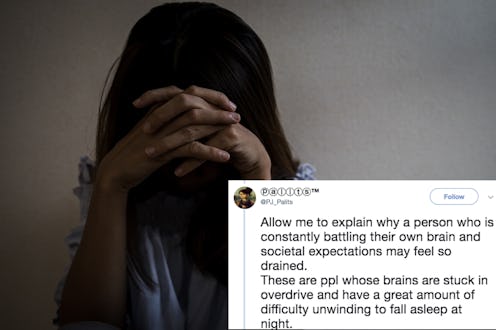Life
This Viral Twitter Thread Makes A Powerful Point About Mental Health & Exhaustion
Depression is more than just sadness. One of its most common signs is a weighty exhaustion that keeps you in bed even when you know you would be better off getting out and doing, well, anything. On Saturday, mental health advocate PJ Palits took to Twitter to explain why depression makes you so tired, hoping that it will help others better understand mental illness. After all, everyone gets tired, sometimes more often than they might like, but not everyone suffers from depression. What's the difference?
According to PJ Palits, who also works as an art director, it stems from a few different factors. For one thing, she explained, people with mental illnesses are "constantly battling their own brain and social expectations," which can be draining in the long term. "For me, 'I'm tired' is not a complaint or pessimistic. It's merely a fact of life," she tweeted.
While people without mental illness may be able to fall asleep relatively quickly, it's a different story for people with mental illness. They may take much longer to fall asleep, and even after they finally start snoozing, their rest may be interrupted by intense dreams, loud noises within their heads, or other disruptions. "Imagine crawling into bed exhausted and it takes the average of an hour to fall asleep, instead of seven minutes," she wrote. "Every nap and bathroom break and the brain relaxation delay begins again."
It's not exactly a restful way to spend the night. PJ Palits compared it to a damaged battery, unable to fully recharge.
But that's not the only reason mental illness makes people exhausted. For some people, focusing on the present takes far more mental energy than the average person requires. Others may be battling invasive thoughts and anxieties, hearing that they "arent [sic] good enough, strong enough, skinny enough."
Then there are the side effects of psychiatric medications. Unfortunately, many anti-depressants are accompanied by side effects including fatigue and drowsiness.
If their mental illness includes hallucinations, they expend mental energy differentiating between reality and the effects of their illness. On top of sensory overload, people with mental illnesses may be overwhelmed by having to explain themselves over and over again. "These are people who are in a constant war with other people's judgment and lack of understanding," she tweeted.
With all this in mind, it's no wonder exhaustion is commonly associated with depression. In fact, it's one of the symptoms doctors look for when diagnosing the illness. "We see prominent symptoms of fatigue in the majority of patients with depression," explained Dr. Maurizio Fava, a professor of psychiatry at the Harvard Medical School, in a 2011 article. "In fact, fatigue is one of the most prevalent presenting symptoms of [major depressive disorder (MDD)], the second most prominent residual symptom of MDD, and is often associated with impaired concentration, irritability, and reduced productivity."
Unfortunately, feelings of fatigue can make it difficult to take steps to resolve depression — it's a mental catch-22. That's why PJ Palits concluded her Twitter thread by asking people to be "patient and empathetic" with mental illness. "The next time someone with an invisible disability says that they're tired, please don't treat them as if they're lazy or irrational. ... Just because you don't experience it doesn't mean that it's not a reality for someone else," she tweeted.
Her thread caught on with other Twitter users. More than 48,000 users liked the first tweet, and each subsequent post received thousands of likes as well. Most users appeared to suffer from depression themselves and applauded her for putting their feelings into words. "Sometimes I forget that lots of people are in the same boat as me and I hope everyone gets better in their own time," wrote one user.
Whether you identify with the thread or simply want to understand other people's struggles, you can read the entire thread for yourself on Twitter.
